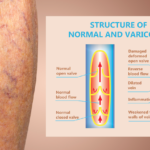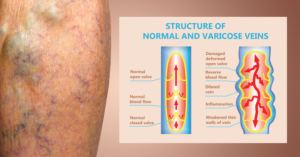 Pelvic Congestion Syndrome is a chronic medical condition that affects nearly 1/3 of all women at some point during their lifetime.
Pelvic Congestion Syndrome is a chronic medical condition that affects nearly 1/3 of all women at some point during their lifetime.
Pelvic congestion syndrome is a condition that causes chronic pain in the pelvic region. When this happens, the veins in your pelvis can enlarge and change shape, like varicose veins. This type of damage causes veins to become varicose. Blockages create backflows of blood because the veins do not close properly anymore. The result is pressure build-up and bulging veins. When this happens in the region of the pelvis varicose veins can affect the uterus, vulva, and ovaries causing great pain and distress.
It can be diagnosed when it is nonrelated to the menstrual cycle and lasts 6 months or longer (the time frame for a condition to be considered chronic). This condition is aggravated by standing for long periods of time.
How to Diagnose PCS
Pelvic Congestion Syndrome may occur in a wide range of ages for women between 20 and 50 years of age. Additional symptoms can include abnormal menstrual bleeding, irritable bladder, vaginal discharge and even visible varicose veins present on the thighs, vulva or buttocks. These areas are often overlooked and do not show up on imaging. Because of this, it is often tough to diagnose. Make sure you do a thorough at-home mirror check of your entire body and report any abnormalities to your doctor.
If pelvic pain worsens later in the day or when standing yet you can’t seem to get a proper diagnosis to come into Tampa Cardiovascular Associates we are able to work in conjunction with your gynecologist.
The Treatment
The procedure is performed under local anesthesia with IV sedation. The blood supply to the veins is blocked by the use of coils and embolic agents. An 80% pain reduction has been reported by those who have undergone this procedure.
Pelvic congestion syndrome is treated using minimally invasive, non-surgical, trans-catheter techniques. Contrast dye may be injected to confirm which veins are affected. If varices are found on venography, they are embolized with small coils or other FDA approved chemical agents.
The Recovery
The first of two visits is an overnight admission to the hospital. The purpose is for managed pain care during the first 24 hours. The patient is then discharged and can recover at home using oral pain medication for the relief of discomfort. Any pain experienced is most significant during the first three days after either procedure.
The second is an outpatient appointment. Most patients see great improvement. It is important to note that in some cases other pelvic veins are also affected and may require further treatment in the future.
If you are experiencing pelvic pain that seems outside the scope of normal monthly reproductive cycle issues, please give us a call at Tampa Cardiovascular Associates at 813-975-2800. www.TampaCardio.com


 Sugar hits the pleasure center of the brain in the same way that hard drugs do. This makes refined sugar extremely addictive and very hazardous to your health. Moderation is key and elimination even better.
Sugar hits the pleasure center of the brain in the same way that hard drugs do. This makes refined sugar extremely addictive and very hazardous to your health. Moderation is key and elimination even better.
 Our circulatory system is an amazing mechanism. Veins run throughout our entire body. They feed blood to every organ and cellular tissue. When veins sustain damage from trauma or vein disease – venous insufficiency they begin stages of venous insufficiency.
Our circulatory system is an amazing mechanism. Veins run throughout our entire body. They feed blood to every organ and cellular tissue. When veins sustain damage from trauma or vein disease – venous insufficiency they begin stages of venous insufficiency. 